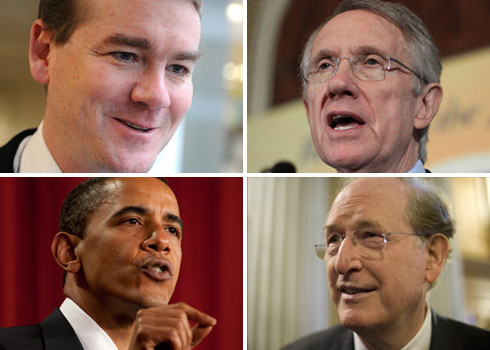The push to revive the public option suffered a major setback today when White House Press Secretary Robert Gibbs said the popular measure lacks the 50 votes it would need in the Senate to survive the budget reconciliation process. Gibbs’ abruptness caught Senate Dem leadership by surprise, but what he said isn’t really at odds with their own take. And yet, the number of public proponents of the plan keeps growing, and it’s easy to remember a time when it seemed pretty clear that there were at least 50 votes for a public option in the Senate.
So what are the public option’s chances in the Senate? Ostensibly, they’re not very good.
“I think the public option ought to be done, but it’s a long shot,” said Sen. Arlen Specter (D-PA). Specter is one of 23 signatories to a letter advocating passing the public option by way of reconciliation, so he has his eyes wide open. And there’s some reason to believe this. The public option had four ardent Democratic opponents during the long fight over the Senate bill this past fall and winter: Sens. Ben Nelson (D-NE), Mary Landrieu (D-LA), Blanche Lincoln (D-AR), and Joe Lieberman (I-CT).
Starting from 59 votes, that means the Democrats have a maximum of 55 votes for a public option now. But there are some members who still might demur. Sen. Jay Rockefeller (D-WV) says he’s not inclined to support the push. Sen. Tom Carper (D-DE) says he does not support using reconciliation to enact a public option. Sen. Evan Bayh (D-IN) has been lukewarm at best to the idea of passing anything through reconciliation.
That’s 53. Then there are other moderates and vulnerable Dems who–particularly in the wake of the Massachusetts election–might not have the stomach for playing hardball with a polarizing measure like the public option. On this score, think Senators like Jim Webb (D-VA), Mark Begich (D-AK), Mark Warner (D-VA), Mark Pryor (D-AR), and several others. Clearly it’s conceivable to imagine the final tally being below the necessary 50.
A top Senate Democratic aide put it to me this way. “We’re not willing to go down the same path I think that we went down in December where we see things fall apart over one specific provision.”
“When you look at the vote tally, it looks like it’s close,” the aide went on. “I think that we’re still dealing with the–the caucus has been strained as a result of what happened in the Massachusetts election, and since then we’ve also had so many senators say that they’re retiring. We’re in a weird spot and I think people are afraid of rocking the boat.”
So what does that mean. For the time being, it means that, lacking institutional backing from the White House and Senate leadership, the public option can only win the day if outside groups manage to make it seem dangerous and inexcusable not to pass it. As Adam Green, the co-founder of the Progressive Change Campaign Committe, told me “Ultimately we want to get to 50 [signatories]. Our short term goal is to get to 40 which would build an air of inevitability around this. At this rate, we’re picking up one or two a day, a week from now we should be approaching 40.”
So far, 23 have signed. There are certainly some strong public option advocates who have not signed on–in part because of the Thursday health care summit. They and others may join on later. But it’s a long way to 50. Still, keep an eye on that effort.










